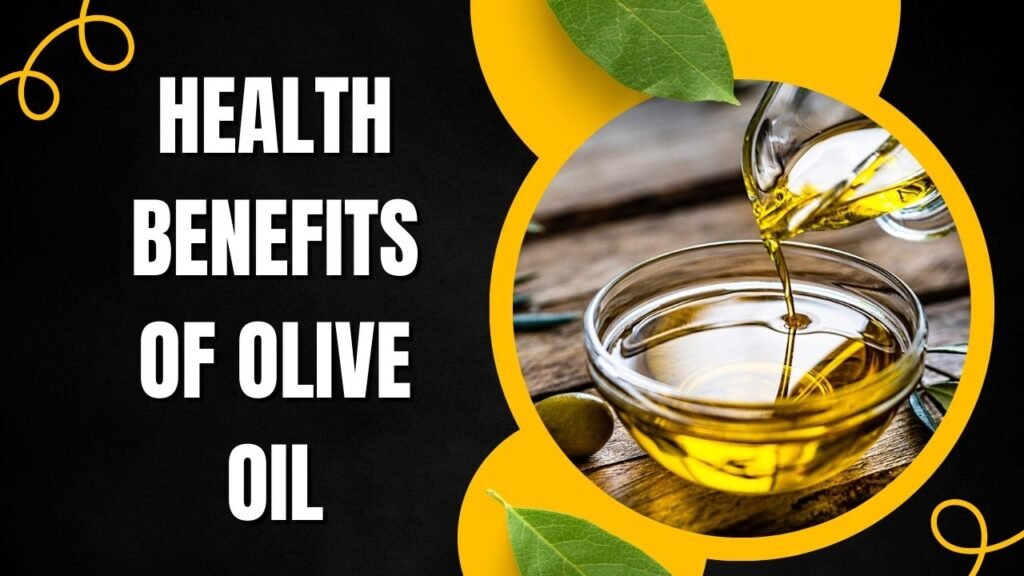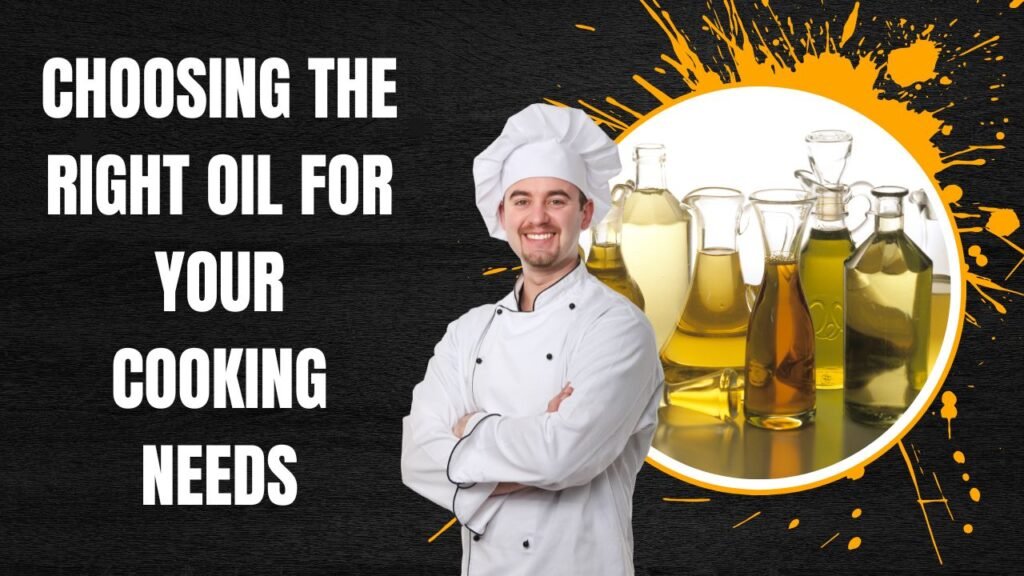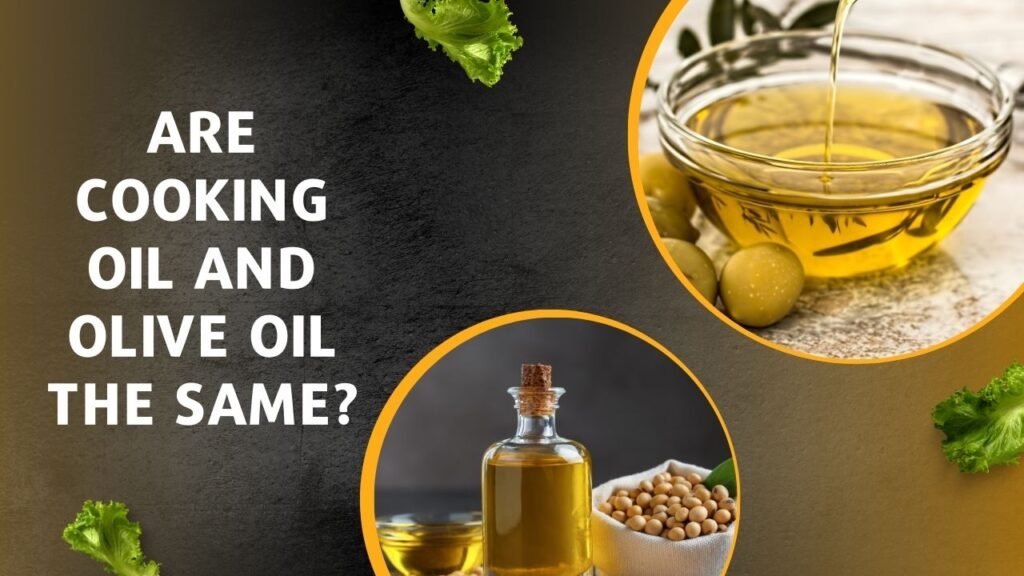Have you ever stood in the grocery store aisle, pondering, are cooking oil and olive oil the same? With countless options on the shelf, it’s easy to get confused. Whether you’re a seasoned chef or a home cook, understanding the differences and similarities between cooking oil and olive oil can elevate your culinary game. Let’s delve into the nuances of these kitchen essentials to clear up the confusion and help you make informed choices for your recipes.
Understanding Cooking Oil and Olive Oil
What is Cooking Oil?
Cooking oil is a broad term that encompasses various oils used in culinary practices. These oils can be derived from plants, animals, or synthetic sources and are utilized for frying, baking, sautéing, and dressing. The key characteristics of cooking oils include their smoke points, flavors, and nutritional profiles.
What is Olive Oil?
Olive oil is a specific type of cooking oil extracted from olives, the fruit of the olive tree (Olea europaea). It is renowned for its rich flavor, versatility in the kitchen, and numerous health benefits. Olive oil is a staple in Mediterranean cuisine and comes in various grades, including extra virgin, virgin, and refined olive oil, each with distinct qualities.
Are Cooking Oil and Olive Oil the Same?
Comparing Sources
One of the primary differences between cooking oil and olive oil lies in their sources:
- Cooking Oil: Can be derived from a variety of sources such as soybeans, canola, sunflower seeds, corn, and even animal fats like lard and tallow.
- Olive Oil: Specifically extracted from olives, making it a unique subset within the broader category of cooking oils.
Comparing Nutritional Profiles
The nutritional content varies significantly between olive oil and other cooking oils:
- Olive Oil:
- High in monounsaturated fats, particularly oleic acid.
- Contains antioxidants like vitamin E and polyphenols.
- Low in saturated fats compared to some other oils.
- Other Cooking Oils:
- Varies widely; for example, canola oil is also high in monounsaturated fats and contains omega-3 fatty acids.
- Sunflower oil is rich in vitamin E but higher in polyunsaturated fats.
- Coconut oil, while technically a cooking oil, is high in saturated fats.
Comparing Culinary Uses
Both olive oil and other cooking oils are versatile, but they have distinct best uses based on their properties:
- Olive Oil:
- Best For: Salad dressings, drizzling over finished dishes, low to medium-heat cooking.
- Flavor Profile: Rich, fruity, and sometimes peppery, which can enhance the taste of dishes.
- Other Cooking Oils:
- Best For: High-heat cooking like frying and sautéing, baking, and general-purpose cooking.
- Flavor Profile: Varies from neutral (canola, sunflower) to more pronounced flavors (sesame oil).
Types of Cooking Oils vs. Types of Olive Oils
Common Cooking Oils
- Canola Oil: Known for its neutral flavor and high smoke point, making it ideal for frying and baking.
- Sunflower Oil: Light in flavor with a high smoke point, suitable for various cooking methods.
- Soybean Oil: Often used in processed foods, has a neutral taste.
- Peanut Oil: Favored for frying due to its high smoke point and mild flavor.
- Coconut Oil: Adds a sweet, tropical flavor, suitable for baking and sautéing.
Different Grades of Olive Oil
- Extra Virgin Olive Oil (EVOO): The highest quality, with a robust flavor and low acidity. Best used in dressings and for finishing dishes.
- Virgin Olive Oil: Slightly less refined than EVOO, still retains good flavor and is suitable for cooking.
- Refined Olive Oil: Has a higher smoke point but a milder flavor, making it suitable for high-heat cooking.
- Light Olive Oil: Despite the name, it refers to the lighter flavor and higher smoke point, not the calorie content. Ideal for baking and frying.
Table: Types of Cooking Oils vs Types of Olive Oils
| Category | Cooking Oils | Olive Oils |
|---|---|---|
| Source | Various plants, animal fats, synthetic sources | Olives (Olea europaea) |
| Grades/Varieties | Canola, sunflower, soybean, peanut, coconut | Extra virgin, virgin, refined, light |
| Flavor Profile | Ranges from neutral to distinct | Rich, fruity, sometimes peppery |
| Best Uses | Frying, baking, general cooking | Dressings, finishing dishes, low-medium heat |
| Nutritional Content | Varies widely | High in monounsaturated fats, antioxidants |
Health Benefits and Considerations

Health Benefits of Olive Oil
Olive oil is celebrated for its numerous health benefits:
- Heart Health: High in monounsaturated fats, which can help reduce bad LDL cholesterol levels and increase good HDL cholesterol.
- Antioxidants: Contains polyphenols and vitamin E, which combat oxidative stress and inflammation.
- Anti-Inflammatory Properties: Helps reduce inflammation in the body, which is linked to various chronic diseases.
Health Benefits of Other Cooking Oils
Other cooking oils also offer health benefits, depending on their type:
- Canola Oil: Contains omega-3 fatty acids, which are beneficial for heart health.
- Sunflower Oil: High in vitamin E, which acts as an antioxidant.
- Peanut Oil: Provides healthy fats and is a good source of vitamin E.
- Coconut Oil: Although high in saturated fats, it contains medium-chain triglycerides (MCTs) that may aid in metabolism.
Potential Health Concerns
While cooking oils offer health benefits, some considerations include:
- Saturated Fats: Oils like coconut oil are high in saturated fats, which can raise LDL cholesterol if consumed in excess.
- Refining Process: Highly refined oils may lack beneficial nutrients and contain unhealthy trans fats if not properly processed.
- Omega-6 to Omega-3 Ratio: Some oils are high in omega-6 fatty acids, which can promote inflammation if not balanced with omega-3 intake.
Flavor Profiles and Culinary Applications
Flavor of Olive Oil
Olive oil’s distinct flavor can range from mild to robust, depending on the grade:
- Extra Virgin Olive Oil: Rich and fruity, ideal for enhancing salads, vegetables, and dips.
- Virgin Olive Oil: Slightly less intense but still flavorful, suitable for cooking and baking.
- Refined and Light Olive Oil: Milder in flavor, making them versatile for high-heat cooking without overpowering other ingredients.
Flavor of Other Cooking Oils
Other cooking oils offer a wide range of flavors:
- Canola Oil: Neutral, making it perfect for dishes where oil flavor shouldn’t dominate.
- Sunflower Oil: Light and mild, suitable for a variety of recipes.
- Peanut Oil: Slightly nutty, enhancing the flavor of fried and Asian dishes.
- Coconut Oil: Sweet and tropical, adding a unique twist to baked goods and stir-fries.
Balancing Flavor and Health
Choosing the right oil can enhance both the flavor and nutritional value of your dishes. For example, using extra virgin olive oil in a salad dressing not only adds rich flavor but also provides healthy fats and antioxidants.

Choosing the Right Oil for Your Cooking Needs
When to Use Olive Oil
- Dressings and Marinades: Its rich flavor complements vinegars and herbs.
- Low-Heat Cooking: Ideal for sautéing vegetables and cooking meats at lower temperatures.
- Finishing Dishes: Drizzle over cooked dishes to add a burst of flavor.
When to Use Other Cooking Oils
- High-Heat Cooking: Use oils like canola, sunflower, or peanut oil for frying and grilling due to their high smoke points.
- Baking: Neutral oils like canola or grapeseed oil are perfect for baked goods, providing moisture without altering the taste.
- Versatile Applications: Use neutral oils for general cooking tasks where a strong flavor isn’t desired.
Table: Best Cooking Oils for Specific Uses
| Cooking Method | Best Oils | Reasons |
|---|---|---|
| Frying | Canola Oil, Peanut Oil | High smoke points, neutral to mild flavors |
| Baking | Canola Oil, Grapeseed Oil | Neutral taste, consistent texture |
| Salad Dressings | Extra Virgin Olive Oil, Walnut Oil | Rich flavors, healthy fats |
| Sautéing | Olive Oil, Canola Oil | Versatile, maintains oil stability at moderate heat |
| Grilling | Avocado Oil, Safflower Oil | High smoke points, robust flavors |
| Asian Cuisine | Sesame Oil, Grapeseed Oil | Distinct flavors, suitable for stir-frying |
Sustainability and Ethical Considerations
Sustainable Choices
Choosing sustainably sourced oils can reduce environmental impact. Look for certifications like Organic, Fair Trade, or Non-GMO to ensure ethical and eco-friendly production practices.
Ethical Sourcing
Opting for oils that are certified organic or sustainably sourced ensures that the products are produced with minimal environmental harm and fair labor practices. For example, choosing PDO (Protected Designation of Origin) olive oil guarantees traditional production methods and regional authenticity.
Table: Sustainability and Ethical Certifications
| Certification | What It Ensures | Common Oils |
|---|---|---|
| Organic | No synthetic pesticides or fertilizers | Olive, canola, sunflower |
| Fair Trade | Ethical labor practices | Coconut, avocado |
| Non-GMO | No genetically modified organisms | Canola, soybean |
| PDO | Traditional production methods | Olive oil |
Personal Reflections: My Oil Choices in the Kitchen
I remember the first time I stood in the kitchen wondering, are cooking oil and olive oil the same. My grandmother swore by her extra virgin olive oil for everything, while I reached for canola oil for its versatility and neutral taste. Over time, I’ve come to appreciate the unique qualities each oil brings to the table. Using the right oil for the right dish not only enhances flavors but also aligns with health and sustainability values. It’s fascinating how something as simple as oil choice can make such a difference in your cooking experience!
FAQs About Are Cooking Oil and Olive Oil the Same
1. Are all olive oils considered cooking oils?
Yes, all olive oils are a type of cooking oil. However, they come in different grades such as extra virgin, virgin, and refined, each suited for specific culinary uses.
2. Can I substitute olive oil with other cooking oils in recipes?
Generally, yes. However, substituting olive oil with a different cooking oil may alter the flavor and nutritional profile of the dish. Choose an oil with a similar smoke point and flavor profile for the best results.
3. Is extra virgin olive oil healthier than regular cooking oil?
Extra virgin olive oil is often considered healthier due to its higher content of monounsaturated fats and antioxidants. It also has a richer flavor and is less processed compared to many regular cooking oils.
4. Can I use olive oil for high-heat cooking?
While refined and light olive oils have higher smoke points suitable for high-heat cooking, extra virgin olive oil is best used for low to medium-heat applications to preserve its flavor and nutritional benefits.
5. Are there any oils that combine the benefits of olive oil and other cooking oils?
Avocado oil is a great example, as it offers a high smoke point similar to many cooking oils and is rich in monounsaturated fats like olive oil. It provides versatility for both high-heat cooking and adding flavor to dishes.
Table: Comparison of Olive Oil and Common Cooking Oils
| Feature | Olive Oil | Canola Oil | Sunflower Oil | Peanut Oil |
|---|---|---|---|---|
| Source | Olives | Canola plant | Sunflower seeds | Peanuts |
| Smoke Point (°F) | 375-420 (extra virgin) | 400-450 | 440 | 450 |
| Flavor Profile | Rich, fruity | Neutral | Mild, neutral | Mild, nutty |
| Best Uses | Dressings, low-heat cooking, finishing dishes | Frying, baking, sautéing | Frying, baking, roasting | Frying, deep-frying |
| Nutritional Highlights | High in monounsaturated fats, antioxidants | Low in saturated fats, contains omega-3 | High in vitamin E, low in saturated fats | High smoke point, good source of vitamin E |
| Health Benefits | Supports heart health, anti-inflammatory | Heart-healthy fats, omega-3 rich | Antioxidants, heart-healthy | Antioxidants, heart-healthy |
Final Thoughts
When considering are cooking oil and olive oil the same, the answer is both yes and no. While olive oil is a type of cooking oil, it stands out due to its unique flavor, nutritional profile, and health benefits. Cooking oils encompass a much broader range of products with diverse sources, flavors, and uses. Understanding the differences can help you make informed choices that enhance your cooking, support your health, and align with your ethical values.
Next time you’re in the kitchen, take a moment to consider which oil best suits your recipe. Whether you’re aiming for a flavorful stir-fry with sesame oil or a neutral backdrop with canola oil, the right choice can make all the difference. Embrace the variety, experiment with different oils, and enjoy the rich flavors and textures they bring to your meals. Happy cooking!


